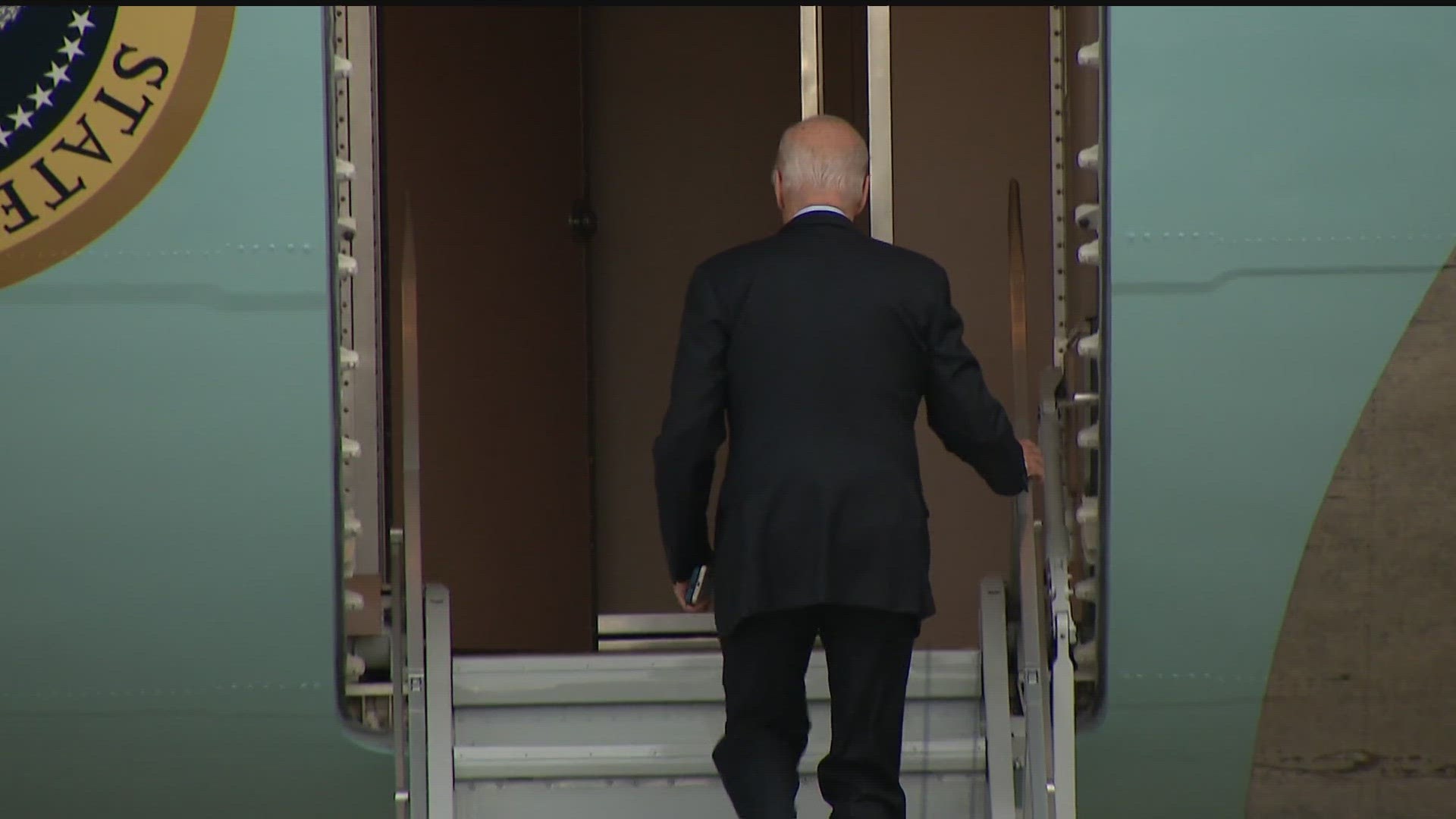WASHINGTON — President Biden boarded Air Force One on Tuesday afternoon for Tel Aviv, where he will meet with Israeli Prime Minister Benjamin Netanyahu about the country's war with Hamas.
Much like his trip to Ukraine earlier this year, Biden's visit to wartime Israel is intended to show solidarity with the U.S. ally, after Hamas carried out what the president has described as the worst terrorist attack on the Jewish people since the Holocaust and "an act of sheer evil."
At the same time, the Biden administration has been rushing to contain the Middle East conflict and limit civilian casualties. Following Israel's counterattack and siege of Gaza, the United Nations has deemed the situation a humanitarian catastrophe as hundreds of thousands of people flee northern Gaza with dwindling supplies.
"We're making sure Israel has what it needs to defend itself, and respond to these attacks. It's also priority to me, to urgently address the humanitarian crisis in Gaza," Biden said last week during a speech in Philadelphia. "We can't lose sight of the fact that the overwhelming majority of Palestinians had nothing to do with Hamas, and Hamas' appalling attacks."
After the Israel trip, Biden was expected to meet with the leaders of Jordan, Egypt and the Palestinian Authority, but that summit was canceled after Tuesday's Gaza City hospital explosion. Leaders in Israel and Gaza have blamed each other for the blast, while President Biden said he was "outraged and deeply saddened" by the event and "directed my national security team to continue gathering information about exactly what happened."
Leading up to Biden's visit to Israel, his administration — namely Secretary of State Antony Blinken — worked feverishly to secure a commitment from Israel to start working on a humanitarian plan for Gaza. According to CNN, "American officials want humanitarian plans for Gaza fully signed off on and implemented" before the start of any possible invasion of Gaza.
Eric Schwartz, a professor at the University of Minnesota's Humphrey School of Public Affairs and former assistant Secretary of State under President Obama, said Biden faces an "enormously complex challenge" in his Wednesday meeting with Israeli officials and Prime Minister Netanyahu. Biden has known Netanyahu for the better part of a half-century, although the two are politically ideological opposites, given that Biden is a Democrat and Netanyahu has led what some have called the most right-wing government in Israel's history.
Biden has shied away from direct criticism of Israel, although he did tell Scott Pelley of 60 Minutes that he does not support an Israeli occupation of Gaza if they were to dispose of Hamas, a U.S.-designated terrorist group that seized power in the Gaza Strip from the Palestinian Authority in the mid-2000s.
"I think the president has really got to talk very frankly, in a very straightforward way, to the Israelis about protection of civilians," Schwartz said. "If he's not prepared to do that publicly, his comments in private have got to be pretty straightforward on this issue because it's going to have a dramatic impact on the politics of this situation, not to mention the lives of Palestinians."
There are mounting fears that the Middle East crisis could escalate beyond Israel and Hamas, given that Hamas is allied with both Iran and the Lebanese militant group Hezbollah. Iran has already threatened a response against Israel if it were to invade Gaza, and Hezbollah fighters are clashing again with Israel on the country's northern border.
"I'm very concerned. We can't suffer from a failure of imagination in terms of how this kind of a conflict can escalate," Schwartz said. "Hezbollah has considerably greater power than Hamas, more troops, more sophistication. If Hezbollah was drawn into this conflict, I think that would complicate the issue considerably for the Israelis."
To deter Iran and Hezbollah, the Biden administration has already sent two aircraft carriers to the Eastern Mediterranean.
As he's balancing the risk of further escalation, Biden's meeting in Israel also has long-term implications. Like so many prior administrations, the Biden administration still publicly supports the long-elusive "two-state solution" for Israel and Palestine.
Given his expertise as a former assistant Secretary of State, Eric Schwartz previously told KARE 11 that he would still be pushing for a two-state solution if he were still in government.
"The anger of Israelis is completely understandable, and the desire to strike back at Hamas is completely understandable, but vengeance is not a policy. And vengeance does not get you to a place where you're not going to have these kinds of recurring spasms of violence," Schwartz said. "We have to be looking at a solution to this challenge that recognizes the rights of all parties in these territories."
Watch more local news:
Watch the latest local news from the Twin Cities and across Minnesota in our YouTube playlist:
WATCH MORE ON KARE 11+
Download the free KARE 11+ app for Roku, Fire TV, Apple TV and other smart TV platforms to watch more from KARE 11 anytime! The KARE 11+ app includes live streams of all of KARE 11's newscasts. You'll also find on-demand replays of newscasts; the latest from KARE 11 Investigates, Breaking the News and the Land of 10,000 Stories; exclusive programs like Verify and HeartThreads; and Minnesota sports talk from our partners at Locked On Minnesota.
- Add KARE 11+ on Roku here or by searching for KARE 11 in the Roku Channel Store.
- Add KARE 11+ on Fire TV here or by searching for KARE 11 in the Amazon App Store.
- Learn more about the KARE 11+ app for Apple TV in the Apple App Store.
- Learn more about KARE 11+ here.

